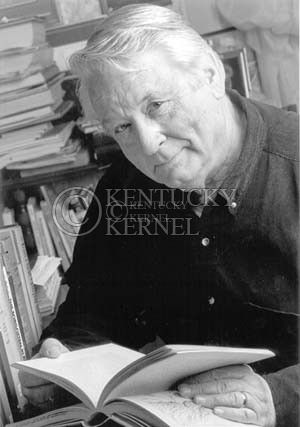UK professor, CBS reporter David Dick dies

July 22, 2010
“Never, never give up” is a sign that used to hang in the office of David Dick, former UK professor and CBS News correspondent.
If you talked to the family, friends and former colleagues of Dick, they would tell you he stayed true to that sign in his office.
After years of battling with cancer, Dick died July 16 at the age of 80.
“David was a professor, an author, a director of journalism and an Emmy-award winning CBS News correspondent at the height of the ‘Tiffany Network,’ ” said Buck Ryan, who succeeded Dick as director of the School of Journalism and Telecommunications in 1994.
Dick began working with CBS in 1966. He traveled the world reporting from Latin America, Mexico and South America among many other nations.
Sam Dick, David Dick’s son, likened his father to the Yankees, Ryan said. The Yankees had the era of Babe Ruth and Joe DiMaggio, whereas David Dick worked with Walter Cronkite at the height of quality broadcast journalism.
And Dick wasn’t only at “the top of his game,” he hit home run after home run with his coverage.
Dick covered everything from the civil wars in Central America at the time to the assassination attempts of Gov. George Wallace. His coverage of Wallace won him an Emmy in 1972.
Perhaps one of his greatest successes was covering the Jonestown massacre in Jonestown, Guyana. Nine hundred people in Jonestown following Rev. Jim Jones drank poison in order to commit suicide. Dick was the first reporter there.
Upon arriving, Dick found the last letters written to the families of Jones’ followers. Dick then told the stories of the dead from their letters.
“Journalism students today will see the path to immortality lies in the ability to know a good story and be able to seize it and then tell it in a memorable way,” Ryan said.
Dick attended UK as a student in the fall of 1948, left in 1951 to join the Navy and then returned to UK to graduate in 1956.
After working with CBS, Dick returned to UK as the seventh director of UK’s school of journalism.
As director, Dick oversaw the merger of the School of Journalism with the Department of Telecommunications to form what is now the School of Journalism and Telecommunications in the College of Communications and Information Studies.
“What separated David from other great journalists I have known is this wry smile in his eyes when he could tell you something important. He was somebody who, to me, had a great sense of humor,” Ryan said.
There was a legend at UK that David grew corn out of the back of his pick-up truck.
“David was his own man, with all that journalism in his blood. The farm never left his bloodstream either. Those kinds of things distinguished him,” Ryan said.
Dick saw horrific sights covering civil wars and massacres, but one thing that helped him get through it all was a view from Plum Lake.
“The View from Plum Lick” is not only one of Dick’s many novels, but a mental picture of his home in Kentucky that helped balance him out.
Dick would close his eyes, imagine his view of the lake and he would be brought back to sanity.
David will be truly missed by friends, family and former colleagues at UK.
David was many things “but I always believed David was first a poet. Of my various acquaintances in more than 30 years in journalism, I have met precious few historical figures. David Dick was one.
“He will be remembered as one of Kentucky’s native sons who knew and loved the Commonwealth and who could tell its story.”

























































































































































